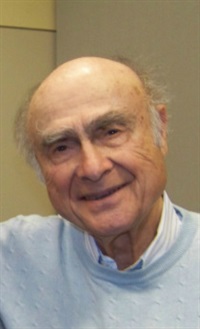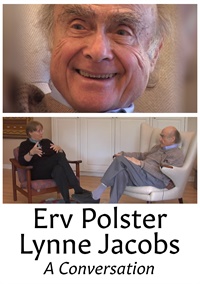A Conversation with Erving Polster and Lynne Jacobs
- Average Rating:
- Not yet rated
- Topic Areas:
- Gestalt | Psychoanalysis | Special Topics | Transference / Countertransference
- Faculty:
- Erving Polster, PhD
- Duration:
- 4 hours
- Format:
- Audio and Video
- Original Program Date:
- Feb 02, 2007
- License:
- Never Expires.
Description
Description:
A Conversation with Erving Polster and Lynne Jacobs.
In this wide-ranging conversation about their lives and their gestalt therapy passions, they also discuss a video session together. The conversations include a look at points of disagreement as well as points of agreement between them. The entire conversation consists of 8 chapters, so that viewers can easily skip through the video to the segments that interest them the most.
Chapters:
- Chapter One: The Conversation Begins: Personal History and Some Gestalt Therapy Theory.
Our conversation begins with a discussion the history of our interest in gestalt therapy and our professional paths. There are a few personal stories, discussions of the intersection of psychoanalysis and gestalt therapy, along with a theory discussion of creative resistance, and a discussion of the tension between a content and process focus. The chapter ends with a look at how Erv and Lynne bridge divides in personal and professional interests.
- Chapter Two: Insights: Lynne Describes Some Insights from Studying Psychoanalysis.
This short segment focuses on Lynne’s integration of a particular contemporary psychoanalytic theory with Gestalt therapy.
- Chapter Three: Theory Matters.
We discuss and argue about similarities and differences in our theoretical and clinical stances. We range widely over topics that catch our interest in the moment. We take on contact, empathy, transference, “meeting,” self-disclosure, judgment and interpretation, awareness, distortion and pungent language vs. theory language. We examine the difference between leading edge (growing edge) focus and trailing edge focus in clinical work, which becomes relevant in the video segment in the next chapter.
- Chapter Four: Clinical Process: A Video of Erving working, with Comments from Lynne.
We watch a video of Erv working with someone eat an Evolution of Psychotherapy conference. Lynne offers a critical analysis of the difference between leading edge and trailing edge focus and the clinical implications of each.
- Chapter Five: Clinical Matters and Theory Matters.
We continue to discuss leading edge/trailing edge approaches to clinical work. A discussion about what we mean by, “self” take place, with agreements and disagreements, and several forays into defining what we mean by the word, “self,” and what we mean by “identity."
- Chapter Six: More Theory, and A Closer Look at Erv’s Self-Experience.
We find ways to speak of “here and now" that can enliven the concept. This segment focuses more on fleshing out our lives with a closer look at how Erv sees himself, with a review of some more of his life, his vulnerabilities, his love of his work.
- Chapter Seven: A Look at "Life-long Learning Communities”.
In this brief segment we take a closer look at Erv’s “community life-long learning” advocacy.
- Chapter Eight: Living with Aging.
In this short segment Erv talks of aging, his life after Miriam, and his continued, living and loving alongside Rose Lee.
Credits
Faculty

Erving Polster, PhD Related Seminars and Products
Erving Polster, Ph.D in clinical psychology, is the Director of The Gestalt Institute of San Diego, and the author of several important books, including Gestalt Therapy Integrated, Every Person's Life is Worth a Novel, and From the Radical Center: The Heart of Gestalt Therapy, as well as dozens of articles and chapters. Erving has authored 6 books. In his current writings, he offers perspectives and designs for a communal application of psychotherapy principles. He also describes and celebrates a powerful contemporary momentum for people-at-large to join together in the search for personal and social enlightenment.
Reviews
Erving Polster, PhD - Humanization of Techniques - Video Stream
Rating: Not yet rated
$59.00 - Base Price
Rating: Not yet rated
$29.00 - Sale
Rating: Not yet rated
$29.00 - Sale
Rating: Not yet rated
$29.00 - Sale
Rating: Not yet rated


